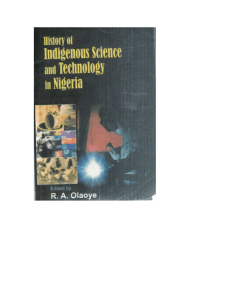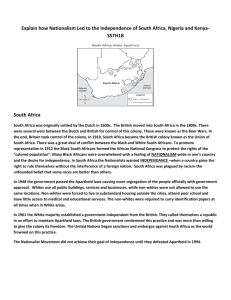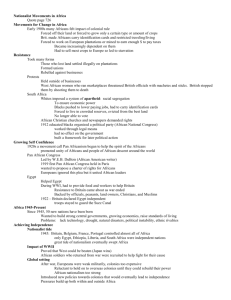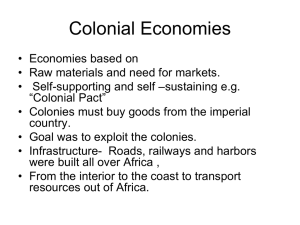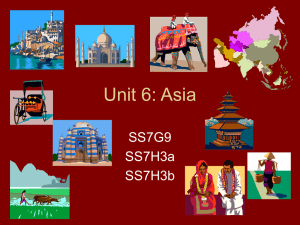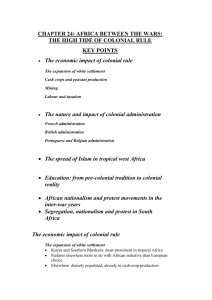Independence Movement Reading
advertisement
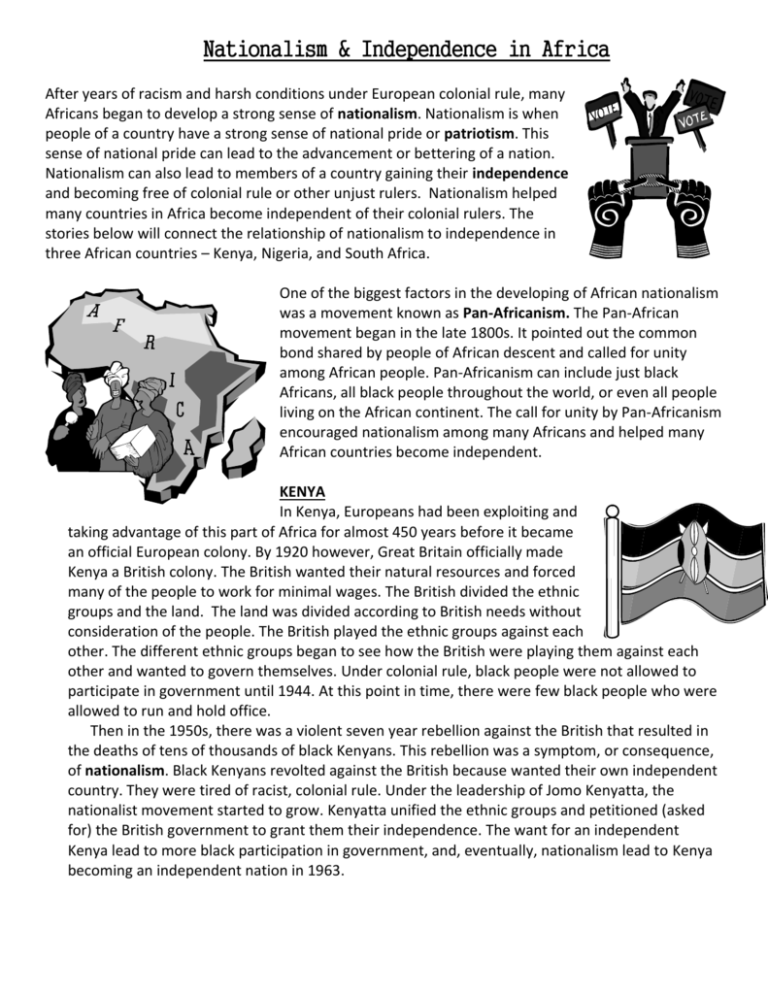
Nationalism & Independence in Africa After years of racism and harsh conditions under European colonial rule, many Africans began to develop a strong sense of nationalism. Nationalism is when people of a country have a strong sense of national pride or patriotism. This sense of national pride can lead to the advancement or bettering of a nation. Nationalism can also lead to members of a country gaining their independence and becoming free of colonial rule or other unjust rulers. Nationalism helped many countries in Africa become independent of their colonial rulers. The stories below will connect the relationship of nationalism to independence in three African countries – Kenya, Nigeria, and South Africa. One of the biggest factors in the developing of African nationalism was a movement known as Pan-Africanism. The Pan-African movement began in the late 1800s. It pointed out the common bond shared by people of African descent and called for unity among African people. Pan-Africanism can include just black Africans, all black people throughout the world, or even all people living on the African continent. The call for unity by Pan-Africanism encouraged nationalism among many Africans and helped many African countries become independent. KENYA In Kenya, Europeans had been exploiting and taking advantage of this part of Africa for almost 450 years before it became an official European colony. By 1920 however, Great Britain officially made Kenya a British colony. The British wanted their natural resources and forced many of the people to work for minimal wages. The British divided the ethnic groups and the land. The land was divided according to British needs without consideration of the people. The British played the ethnic groups against each other. The different ethnic groups began to see how the British were playing them against each other and wanted to govern themselves. Under colonial rule, black people were not allowed to participate in government until 1944. At this point in time, there were few black people who were allowed to run and hold office. Then in the 1950s, there was a violent seven year rebellion against the British that resulted in the deaths of tens of thousands of black Kenyans. This rebellion was a symptom, or consequence, of nationalism. Black Kenyans revolted against the British because wanted their own independent country. They were tired of racist, colonial rule. Under the leadership of Jomo Kenyatta, the nationalist movement started to grow. Kenyatta unified the ethnic groups and petitioned (asked for) the British government to grant them their independence. The want for an independent Kenya lead to more black participation in government, and, eventually, nationalism lead to Kenya becoming an independent nation in 1963. NIGERIA British influence in Nigeria began in 1885 and the territory officially became a British colony in 1914. Britain wanted their natural resources, especially once oil was discovered. Because of ethnic wars, Britain divides the land. Instead of helping, it created severe tension between the ethnic groups A largely peaceful nationalist movement in Nigeria led the British to move Nigeria gradually toward independence between 1945 and 1960. The youth of the colony start a movement. This movement encouraged the people to see themselves as Africans first. This Youth Movement began to promote “African” unity along with the rest of the continent (PanAfrican Movement). Final independence was achieved in 1960. Unfortunately, economic development by the British during the colonial period was unequally distributed in the territory that became the country of Nigeria. This allowed some of the ethnic groups in the country to have greater wealth and power than other ethnic groups. The economic inequalities and tensions between ethnic groups caused multiple wars which lead to many Nigerians dying. These wars also lead to a harsh military government that lasted until 1999. SOUTH AFRICA The earliest colonial conflicts in South Africa occurred between the British and the settlers of Dutch, German, and French origin who were in control of the colony before the British. Eventually, the British Empire gained control over these other European groups and established the area as a new British colony, the Union of South Africa, in 1910 and gave the power to the white population only. The British wanted the natural resources, especially diamonds and gold. The British ruled South Africa until 1961, when the people of South Africa finally demanded their freedom. However, unlike Nigeria and Kenya, the independence of South Africa from the colonial rule was gained mainly by the white minority of European descendents, not the native black South Africans. A nationalist movement started to grow among the white population who were tired of the British controlling them. In 1961, they voted and gained independence from Britain. Moreover, even after independence, all power remained in the hands of white South Africans, just as it had during colonial times. The white South Africans continued a practice called Apartheid, the separation of whites and non-whites. In the end, the white South Africans decision to declare themselves free from colonial rule was driven by their desire to keep the system of Apartheid, which the British were pressuring them to give up. Nevertheless, black opposition (resistance) against the racist practice of Apartheid finally began in 1912. This was when the African National Congress was established. This group fought for the rights of black and “colored” people in South Africa from 1912 until 1994, when Apartheid officially ended. Apartheid ended when the white president of South Africa, F.W. de Klerk, allowed nonwhites to vote in presidential elections. These elections resulted in Nelson Mandela being elected the first black president of South Africa. In the end, the national sense of pride felt by many non-white South Africans was not the main drive for independence from colonial rule. Instead black nationalism led to the end of the racist and unjust system of Apartheid after colonial rule. The end of Apartheid finally established equal rights for black and “colored” South Africans.

